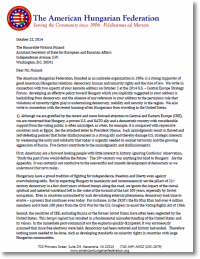 |
The AHF Letter to Sen. McCain is available for download:
English  |
 12/08/14 - AHF submits letter to Sen. John McCain over his "neo-fascist, dictator" comments: "We agree that Hungary is an important country given the recent, alarming and unacceptable developments in Ukraine and otherwise. We fear that your critical characterization of Hungary last week was unjustified and unbalanced and your labeling its prime minister a neo-fascist dictator was just plain wrong. These gratuitous statements further confused, alienated and angered the Hungarian people. Unless appropriately and timely addressed, this, in turn, will undermine support for the security matters noted above to the detriment of American strategic goals." The letter appear is full below and available for [download] 12/08/14 - AHF submits letter to Sen. John McCain over his "neo-fascist, dictator" comments: "We agree that Hungary is an important country given the recent, alarming and unacceptable developments in Ukraine and otherwise. We fear that your critical characterization of Hungary last week was unjustified and unbalanced and your labeling its prime minister a neo-fascist dictator was just plain wrong. These gratuitous statements further confused, alienated and angered the Hungarian people. Unless appropriately and timely addressed, this, in turn, will undermine support for the security matters noted above to the detriment of American strategic goals." The letter appear is full below and available for [download]
December 8, 2014
The Honorable John McCain
United States Senate
Washington, D.C. 20510
Dear Senator McCain:
The American Hungarian Federation (“Federation”), founded in 1906, is an independent, non-partisan entity representing a broad cross-section of the Hungarian American community. From its founding, the Federation has supported democracy, human and minority rights, and the rule of law in Central and Eastern Europe as well as good American/Hungarian relations and the strategic interests of the United States in the region. The Federation is also a member of the Central and East European Coalition, which issued a policy paper on September 15, 2014 on democracy and national security issues in the region. The CEEC Policy Paper is available [here].
We are writing to express our deep concern with the critical statements you made about Hungary during the vote confirming Ambassador Colleen Bell on Tuesday, December 2, 2014, which may unwittingly have an adverse impact on the strategic interests of the United States in Hungary and the region. It has already needlessly undermined good bilateral relations between the United States and Hungary.
Recall your trip to Hungary in January of this year when you astutely identified that interest as follows:
“We also discussed with both the Prime Minister and the opposition our many common foreign policy interests. We share a commitment to consolidating democracy in the Balkans, integrating Ukraine into Europe, fostering a free and peaceful Afghanistan, and deepening security cooperation in NATO, especially on counterterrorism… The United States is grateful for the strong international cooperation that we enjoy with Hungary, and its willingness to play a leadership role on behalf of international peace and security. We believe that the success of our alliance is measured, in large part, by what we do together to support a more democratic, secure, and prosperous future -- not just in Europe but also beyond Europe.”
Indeed, Hungary is a committed NATO, a strong U.S. ally and a democracy, albeit an imperfect and evolving one, as even mature democracies evolve, having regained its freedom from Soviet domination a mere twenty-five years ago. Its support for United States foreign policy goals stands in marked contrast to West European ambivalence about U.S. global leadership after the end of the Cold War. Hungarian identification with the U.S. extended beyond elite opinion and was rooted strongly in the popular imagination. This reservoir of popular support was a precious commodity that gave U.S. foreign policy a competitive advantage in the region during the Cold War and
the years that have followed. It is a commodity we need to nurture today in order for us to be able to effectively stand up against growing Russian aggression and to combat terrorism.
This instinctive popular support, however, has been at risk in Hungary in recent years, mainly due to the perception of a lack of evenhandedness in addressing the political landscape in Hungary. It is also due to a constant public barrage of questionable allegations some of which have been inspired by opposition parties and their allies in the West singling Hungary out for criticism by questioning Hungarians’ commitment to democracy and democratic norms. This barrage is often perceived as humiliating and patronizing by the Hungarian people, many of whom support their government, and tends to ignore that the government has won seven internationally recognized free elections. Even the non-partisan Freedom House in their latest country reports gave Hungary the highest score for its electoral process (12 out of 12) and also high scores for such hallmarks of democracy as
respecting freedom of expression and media freedoms. Please see our October 10 letter to President Obama and October 22 letter to Assistant Secretary of State Victoria Nuland for greater detail of these issues.
We agree that Hungary is an important country given the recent, alarming and unacceptable developments in Ukraine and otherwise. We fear that your critical characterization of Hungary last week was unjustified and unbalanced and your labeling its prime minister a neo-fascist dictator was just plain wrong. These gratuitous statements further confused, alienated and angered the Hungarian people. Unless appropriately and timely addressed, this, in turn, will undermine support for the security matters noted above to the detriment of American strategic goals.
We, therefore, respectfully urge you to apologize to the Hungarian people for the unwarranted neo-fascist remark and supplement your statement by publicly referencing the value of Hungary’s contribution as a loyal ally and friend of the United States as you did earlier this year and the reciprocal friendship from the United States toward Hungary and the Hungarian people. We appreciate your attention to this important matter and believe these steps will go a long way to promote American interests in the region. We are prepared to assist you in this endeavor and
suggest that we meet to discuss the same.
Respectfully:
Frank Koszorus, Jr.
National President
Public Member of the U.S. Delegation of the
1989 Conference on Security and Cooperation
in Europe on the Human Dimension |
Bryan Dawson
Co-President
Chair of the AHF Information Committee |
Join and Support Us Online!

[<< Back to All AHF News]
| Related Articles

Amerikai magyarok: John McCain kérjen bocsánatot! A legnagyobb amerikai magyar szervezet, az Amerikai Magyar Szövetség levélben fordult John McCainhez, aggodalmát fejezve ki a szenátornak a Colleen Bell nagykövet szenátusi szavazásán tett kritikus megjegyzései miatt. A szervezet úgy véli, hogy mindez káros hatással van az Egyesült Államok térségi stratégiai érdekeire és rontja a kétoldalú kapcsolatokat. A levél emlékeztet McCain korábbi Budapesten tett megjegyzéseire. [tovább]
 Bocsánatkérést követelnek McCaintől: A magyar néptől való nyilvános bocsánatkérésre szólította fel John McCain szenátort Koszorús Ferenc, az Amerikai Magyar Szövetség (AHF) elnöke és Bryan Dawson társelnök azért az "indokolatlan, újfasizmusra vonatkozó kijelentéséért", amit a politikus Colleen Bell budapesti nagykövet szenátusi megerősítő szavazásán tett. [tovább] Bocsánatkérést követelnek McCaintől: A magyar néptől való nyilvános bocsánatkérésre szólította fel John McCain szenátort Koszorús Ferenc, az Amerikai Magyar Szövetség (AHF) elnöke és Bryan Dawson társelnök azért az "indokolatlan, újfasizmusra vonatkozó kijelentéséért", amit a politikus Colleen Bell budapesti nagykövet szenátusi megerősítő szavazásán tett. [tovább]
 10/10/14 - AHF submits letter to President Obama: "...although we believe that vigilance is necessary to preclude backsliding when it comes to democracy, we are justifiably puzzled and deeply concerned that you lumped Hungary in with Egypt and some of the worst dictatorships of the world in assessing the state of civil society freedoms. We... respectfully call upon you to retract that part of your statement that unjustifiably places Hungary in the same category with Egypt and other such repressive countries. Doing so would help alleviate the concern, confusion and disbelief found in our community about the United States views of Hungary, a democratic ally. It would also serve to advance the goals of the United States in the region." [read more] 10/10/14 - AHF submits letter to President Obama: "...although we believe that vigilance is necessary to preclude backsliding when it comes to democracy, we are justifiably puzzled and deeply concerned that you lumped Hungary in with Egypt and some of the worst dictatorships of the world in assessing the state of civil society freedoms. We... respectfully call upon you to retract that part of your statement that unjustifiably places Hungary in the same category with Egypt and other such repressive countries. Doing so would help alleviate the concern, confusion and disbelief found in our community about the United States views of Hungary, a democratic ally. It would also serve to advance the goals of the United States in the region." [read more]
 10/22/14 - AHF submits letter to US Asst. Secretary of State Victoria Nuland: "The appearance of selective enforcement and the use of anti-corruption measuresas a “big gun” for political purposes that are unrelated to corruption, coupled with the other issues noted in this letter merely befuddle and alienate the Hungarian people and undermine U.S. goals...Corruption cannot, must not be tolerated. It needs to be eradicated wherever found. If not halted, it will undermine democracy and the free market system. We, therefore, support U.S. anti-corruption initiatives. However, in order to be effective, selective prosecution should be meticulously avoided." [read more] 10/22/14 - AHF submits letter to US Asst. Secretary of State Victoria Nuland: "The appearance of selective enforcement and the use of anti-corruption measuresas a “big gun” for political purposes that are unrelated to corruption, coupled with the other issues noted in this letter merely befuddle and alienate the Hungarian people and undermine U.S. goals...Corruption cannot, must not be tolerated. It needs to be eradicated wherever found. If not halted, it will undermine democracy and the free market system. We, therefore, support U.S. anti-corruption initiatives. However, in order to be effective, selective prosecution should be meticulously avoided." [read more]
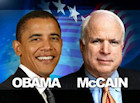 11/6/2008 - The American Hungarian Federation Submitted Questionnaire to Presidential Candidates -- The Federation submitted identical questionnaires to Sen. Obama and Sen. McCain on a strictly non-partisan basis and for educational purposes only, not as endorsement of or opposition to any of the candidates. Barack Obama responds to Hungarian American Community acknowledging need to "continue strengthening democratic institutions throughout Central and Eastern Europe....[and] build respect for human and minority rights in that region and throughout the
world." Hungary's Press also reacts. [read more] 11/6/2008 - The American Hungarian Federation Submitted Questionnaire to Presidential Candidates -- The Federation submitted identical questionnaires to Sen. Obama and Sen. McCain on a strictly non-partisan basis and for educational purposes only, not as endorsement of or opposition to any of the candidates. Barack Obama responds to Hungarian American Community acknowledging need to "continue strengthening democratic institutions throughout Central and Eastern Europe....[and] build respect for human and minority rights in that region and throughout the
world." Hungary's Press also reacts. [read more]
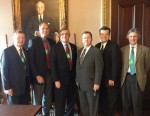 11/14/14 - AHF meets with National Security Council and State Department Officials - On Friday, November 14, 2014, Frank Koszorus, Jr., President of the American Hungarian Federation, and Paul Kamenar and Imre Nemeth, members of the Federation's International Relations Committee, met with Nathaniel Dean, Director for Central and North European Affairs at the National Security Council, Thomas O. Melia, Deputy Assistant Secretary of State, and Ivan Weinstein, Desk Officer for Hungary at the Department of State. [read more] 11/14/14 - AHF meets with National Security Council and State Department Officials - On Friday, November 14, 2014, Frank Koszorus, Jr., President of the American Hungarian Federation, and Paul Kamenar and Imre Nemeth, members of the Federation's International Relations Committee, met with Nathaniel Dean, Director for Central and North European Affairs at the National Security Council, Thomas O. Melia, Deputy Assistant Secretary of State, and Ivan Weinstein, Desk Officer for Hungary at the Department of State. [read more]

Amerikai levél Orbánékról - erről nem beszélhettek a diplomaták: A legnagyobb amerikai magyar szervezet, az Amerikai Magyar Szövetség fordult levélben Victoria Nuland helyettes külügyi államtitkárhoz. [tovább]
 5/9/2014 - AHF Submits Letter to Secretary of State John Kerry expressing concern that the US Embassy's public (as opposed to private) statement about Hungary's history concerning the treacherous year of 1944 may have the unintended consequence of alienating Hungarians at a time when NATO needs to be unified and resolute in confronting the challenges posed by Ukraine and Russia. [more] 5/9/2014 - AHF Submits Letter to Secretary of State John Kerry expressing concern that the US Embassy's public (as opposed to private) statement about Hungary's history concerning the treacherous year of 1944 may have the unintended consequence of alienating Hungarians at a time when NATO needs to be unified and resolute in confronting the challenges posed by Ukraine and Russia. [more]
 5/11/2012 - Budapest’s Central European University hosted a one-day conference to mark the 90th anniversary of diplomatic relations between Hungary and the United States on May 9th. The conference, co-organized by the Ministry of Foreign Affairs and the US Embassy in Budapest, was opened by Hungarian Foreign Minister Janos Martonyi and US Deputy Assistant Secretary of State for European Affairs Bay Fang. [more] 5/11/2012 - Budapest’s Central European University hosted a one-day conference to mark the 90th anniversary of diplomatic relations between Hungary and the United States on May 9th. The conference, co-organized by the Ministry of Foreign Affairs and the US Embassy in Budapest, was opened by Hungarian Foreign Minister Janos Martonyi and US Deputy Assistant Secretary of State for European Affairs Bay Fang. [more]

1/11/2011 - MTI "Objektív véleményalkotásra szólít fel az Amerikai Magyar Szövetség médiaügyben." [tovább]
01/04/11 - AHF Issues its First Statement on Hungarian Media Law: "A Rush to Judgment: The Reaction to the Hungarian Media Law." [more]

1/12/2011 - AMSZ: "a negatív sajtójelentések hamis képet festenek Magyarországról" [tovább]

01/04/11 - Hungarian Media Law: In view of all the critical media play, moderate weekly Heti Válasz broadens discussion on Hungarian media law by adding another perspective. The Hungarian National Media and Infocommunications Authority releases English version of Media Law. It is available for download.
[read more]

 6/22/2010 - AHF editorial, "Fidesz sweep means moment of truth for American policymakers." AHF President Frank Koszorus continues call for even-handedness in US foreign policy: "The President's ability to connect with the people of Central and Eastern Europe will also help determine whether he will succeed or fail in shoring up NATO. An early indicator will be how Washington reacts to the new government in Hungary, following the landslide victory of Viktor Orbán and his center-right party, Fidesz..." [read the full article] 6/22/2010 - AHF editorial, "Fidesz sweep means moment of truth for American policymakers." AHF President Frank Koszorus continues call for even-handedness in US foreign policy: "The President's ability to connect with the people of Central and Eastern Europe will also help determine whether he will succeed or fail in shoring up NATO. An early indicator will be how Washington reacts to the new government in Hungary, following the landslide victory of Viktor Orbán and his center-right party, Fidesz..." [read the full article]
 5/11/2010 - "Meggyőzni Washingtont..." American Hungarian Federation president calls for even-handedness in media coverage on Hungary in Heti Válasz interview following Fidesz's landslide victory in recently held parliamentary elections.
"Miben tudna segíteni az amerikai magyar emigráció az óhazának, amikor a jobbközép győzelmét ismét fanyalogva fogadja az amerikai sajtó?" [tovább] 5/11/2010 - "Meggyőzni Washingtont..." American Hungarian Federation president calls for even-handedness in media coverage on Hungary in Heti Válasz interview following Fidesz's landslide victory in recently held parliamentary elections.
"Miben tudna segíteni az amerikai magyar emigráció az óhazának, amikor a jobbközép győzelmét ismét fanyalogva fogadja az amerikai sajtó?" [tovább]
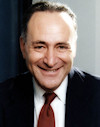 6/11/2008 - Sen. Schumer suggests return of Russia's hegemony in Central and East Europe... AHF (and Central and East European Coalition) sends letter and calls on community to express its concern. On June 3, 2008, Senator Schumer (D-NY) published an article in The Wall Street Journal entitled "Russia Can Be Part of the Answer on Iran." In this article, Sen. Schumer suggests that stronger economic sanctions would help deter Iran from developing nuclear weapons. The effectiveness of the sanctions, according to Sen. Schumer, will require Russia's cooperation. [read more] 6/11/2008 - Sen. Schumer suggests return of Russia's hegemony in Central and East Europe... AHF (and Central and East European Coalition) sends letter and calls on community to express its concern. On June 3, 2008, Senator Schumer (D-NY) published an article in The Wall Street Journal entitled "Russia Can Be Part of the Answer on Iran." In this article, Sen. Schumer suggests that stronger economic sanctions would help deter Iran from developing nuclear weapons. The effectiveness of the sanctions, according to Sen. Schumer, will require Russia's cooperation. [read more]
UPDATE: 7/25/2008 - American Hungarian Federation Participates in CEEC Meeting with Senator Schumer: Discusses Russia "Hegemony" statement. [read more]
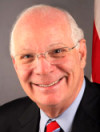 1/11/2013 - AHF again responds to Senator Ben Cardin, Co-Chair of the US Helsinki Commission. In his December 20, 2012 statement, the Senator was unfairly critical of Hungary. "...we are concerned that (1) your assertions concerning Hungary omit relevant facts; and (2) your statement fails to raise the discrimination and intolerant policies toward ethnic Hungarians in some of the countries bordering Hungary. The statement therefore leaves the impression... of bias, which could result in cynicism toward the Helsinki Commission and its valuable and necessary work." [read more] 1/11/2013 - AHF again responds to Senator Ben Cardin, Co-Chair of the US Helsinki Commission. In his December 20, 2012 statement, the Senator was unfairly critical of Hungary. "...we are concerned that (1) your assertions concerning Hungary omit relevant facts; and (2) your statement fails to raise the discrimination and intolerant policies toward ethnic Hungarians in some of the countries bordering Hungary. The statement therefore leaves the impression... of bias, which could result in cynicism toward the Helsinki Commission and its valuable and necessary work." [read more]
  7/22/2010 - AHF reacts to The Washington Post Editorial: "...the editorial, 'Hungary's Strongest Leader Targets the Media,' [July 19], seems to equate the prevailing sentiment in Hungary in support for minority rights and the new passport law with extremism. Nothing is farther from the truth." AHF letters reminded editors about the current extremism [see Slovak Language Law] in neighboring countries and explained that the legacy of Trianon continues to affect the lives of millions of ethnic Hungarians today. 7/22/2010 - AHF reacts to The Washington Post Editorial: "...the editorial, 'Hungary's Strongest Leader Targets the Media,' [July 19], seems to equate the prevailing sentiment in Hungary in support for minority rights and the new passport law with extremism. Nothing is farther from the truth." AHF letters reminded editors about the current extremism [see Slovak Language Law] in neighboring countries and explained that the legacy of Trianon continues to affect the lives of millions of ethnic Hungarians today. 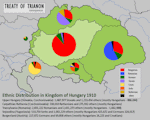 The letters also pointed out the fact that dual citizenship is a common and globally accepted practice even in those same countries that would discriminate against an ethnic Hungarian exercising his rights. AHF feels The Post missed the point and mixed unrelated issues. However, we appreciate the fact the The Post's editorial included a link to AHF's page on the Treaty of Trianon. The letters also pointed out the fact that dual citizenship is a common and globally accepted practice even in those same countries that would discriminate against an ethnic Hungarian exercising his rights. AHF feels The Post missed the point and mixed unrelated issues. However, we appreciate the fact the The Post's editorial included a link to AHF's page on the Treaty of Trianon.
Letters included those from members Frank Koszorus, Jr., AHF President; Bryan Dawson, AHF Executive Chairman; and Geza Cseri, former Science and Technology Advisor to the Allied Supreme Commanders of NATO. The Post published a Letter to Editor from Geza Jeszenszky, former Ambassador
to the United States and Foreign Minister.
All four letters appear in that order below:
Dear Editor:
Based on erroneous assumptions and a casual understanding of the challenges confronting Hungarians, the editorial, "Hungary's strongest leader targets the media," [July 19], seems to equate the prevailing sentiment in Hungary in support for minority rights and the new passport law with extremism. Nothing is farther from the truth. Consequently, the editorial appears biased and falls short of the high standard The Post sets for itself.
Dual citizenship is not uncommon in Europe and elsewhere. Romania, for example, grants dual citizenship to ethnic Romanians living in Moldova.
Remembering the Treaty of Trianon, which transferred over three million ethnic Hungarians to foreign rule, is neither polarizing nor a concern of only the right, as the editorial also suggests. Rather it is an issue today because some of Hungary's neighbors discriminate against their Hungarian minorities. Slovakia, which adopted a language law prohibiting the use of Hungarian in public, or Romania, which refuses to re-establish a former Hungarian university, are examples. If these countries respected minority rights, Trianon would be relegated to the history books.
Perhaps next time The Post will examine the facts a little more closely.
Frank Koszorus, Jr.
President,
American Hungarian Federation
---
Dear Editor:
I was confused by the editorial, "Hungary's strongest leader targets the media," [July 19]. The merits (or lack thereof) of government media controls has little or nothing to do with passports or citizenship which are matters of national identity, not nationalism. Dual-citizenship is a common practice throughout the world as is autonomy and respect for local, historic communities. Is the U.S. nationalist for allowing Americans to live abroad and keep their passports? Is the US extreme for accepting dual citizenship with Britain, France or Mexico? Is Hungary extreme for accepting dual citizenship for ethnic Slovaks living in Hungary? Slovakia accepts dual citizenship for some, but will not extend the same rights to ethnic Hungarians who have lived in their own communities for over 1,100 years. As such, it is clearly discriminatory. Unfortunately, the law to rescind Slovak citizenship for ethnic Hungarians who exercise their right to apply for Hungarian citizenship on Saturday, July 17, 2010.
Is the concern for the basic human rights of an ethnic minority an extremist, extreme right-wing position? Are Catalonians extreme for wanting to speak Catalan with the postman in Catalonia? How about speaking French in Quebec? Spanish in Miami? Italian in Switzerland? Slovakia, under a truly nationalist government that include Jan Slota who called Hungarians, “the cancer of the Slovak nation,” passed a law making it illegal to converse in Hungarian with a Hungarian postman in a post office in an 1100-year old Hungarian village.
For the 40 years of communist rule, it was taboo to discuss topics such as Trianon and asserting rights for ethnic minorities as to not disturb the “socialist brotherhood of nations.” Does the Post long for the brotherhood’s return? As the link you provided explained so well, any objective observer would see Trianon as a huge miscarriage of justice that continues to affect the lives of millions today. It is not a right-wing, extremist issue, it is an issue of human and minority rights that should transcend the political spectrum. The firm re-establishment of democracy in Hungary allows for a full examination of these topics, however uncomfortable for the West who bears the responsibility for creating these minorities and ethnic strife in the first place.
Bryan Dawson
Arlington, VA
---
Dear Sir:
As a 40+ years subscriber to The Post, and a member of the American Hungarian Federation, I would like to response to your Editorial: "Hungary's strongest leader targets the media," [July 19], is based on erroneous assumptions and little understanding of Hungary’s history and psychic. Equating Hungary’s support for Hungarian minorities and of the granting of dual citizenship as being chauvinistic and catering to extremism is further from the truth. Granting dual citizenship is a common practice. The neighboring countries Romania, Slovakia, Czech Republic grant dual citizenship to their ethnic brothers living in neighboring countries. One example is Romania granting dual citizenship to ethnic Romanians living in Moldova. The fact that The Post never raised this issue before regarding the named countries why now when it comes to Hungary? Am I wrong if I detect a bias attitude in this?
When it comes to the Treaty of Trianon, you are telling to the Hungarians to forget it. How can you forget that your arms and legs are cut off, and millions of your brothers are under foreign rule, because that is what happened at Trianon. The Treaty unjustly, with malice, deprived Hungary of 65% of her inhabitants and 72% of her territory, an area as large as Illinois, Indiana, and Ohio or Kentucky combined. The dismemberment also created 16 million ethnic minorities, including millions of Hungarians. This treaty totally altered the political balance of Central Europe which then led to the Balkanization of the area and created the political and economy hardships and turmoil to the country and the area. There are no extremists on this issue since practically the whole nation laments the injustice of Trianon.
If there is revisionalism in Hungary, it is fueled by Slovakia, Romania, Ukraine and Serbia because of their oppressive and discriminatory policies. Slovakia, by the Benes Decrees and its language law prohibiting the use of Hungarian in public, or Romania, which refuses to re-establish a Hungarian university, or the continuous physical beatings of ethnic Hungarians by the Serbs in Voivodina are examples.
I hope that in the future, The Post will be more mindful of the facts and reality.
Geza Cseri
Mc Lean VA
President, CIC, Inc. and
former Science and Technology Advisor
to the Allied Supreme Commanders of NATO
---
An unfair portrayal of Hungarian politics - 7/24/2010
[see original Letter to the Editor]
The July 19 editorial "Hungary's rightward lunge" was as inaccurate as it was unfair. It also revealed a superficial understanding of Hungary and Fidesz, the party that just won a landslide victory in the parliamentary elections this spring. A few examples:
In 2002, Hungary's prime minister, Viktor Orbán, did not cater to "Hungary's extreme right," as the editorial stated, but successfully opposed it and helped oust its representatives from parliament by defeating them during the elections.
Although Washington did not welcome Hungary's decision to purchase fourth-generation Swedish-British Gripen fighter planes rather than used American F-16s, it did not make Mr. Orbán persona non grata and a pariah, as the editorial suggested. In March 2002, President George W. Bush telephoned Mr. Orbán and invited him to visit the United States following the elections, which looked like an almost certain victory for Mr. Orbán's Fidesz Party.
As a staunch friend of the United States and an appreciative reader of The Post, I hope that the editorial policy relating to Hungary will be more balanced and factual in the future.
Géza Jeszenszky, Budapest
The writer was Hungary's ambassador to the United States from 1998 to 2002.
- April 29, 2003 - US Senate Testimony: "NATO Enlargement: Promoting Western Values, Strengthening the Alliance." Calling attention to minority protections. before the United States Senate Committee on Foreign Relations.
- March 25, 2009 - US Senate Reception on the Occasion of the Policy Reception in Honor of NATO and Its Enlargement - : Remarks of Frank Koszorus, Jr.
- April 2009 - CEEC statement on NATO Enlargement and Supporting the Open Door Policy.
- July 2007 - Hungary's Accession to NATO: An expanded report by Frank Koszorus, Jr.
- October - November 1997: The Debate on NATO Enlargement:
Hearings Before the U.S. Senate Committee on Foreign Relations. Testimony of Frank Koszorus, Jr., President, AHFDC. An interesting exchange with Sen. John Kerry.
- June 20, 1996 - U.S. Policy Toward NATO Enlargement: Hearing before the Committee on International Relations,
United States House of Representatives 104th Congress, Second Session: Testimony of Frank Koszorus, Jr., President, AHFDC.
- June 2007 - Hudson Institute Panel: Enduring Strains of Communism
in Central and Eastern Europe
- March 29, 2004 - On the Occasion of NATO Expansion, Corcoran Gallery of Art. AHF Remarks by Frank Koszorus, Jr.: NATO
Enlargement and Minority Rights
- October 24, 2003 - AHF Memorandum on Romanian President Iliescu Visit
Key Dates in Hungarian-American Diplomatic Relations: Diplomatic relations between Hungary and the United States were formally established in 1922, although unofficial contacts have been present ever since the War of Independence. Colonel Commandant Michael Kováts, a Hungarian nobleman is regarded as the founder of the American Cavalry, and was one of the first heroes to lay down his life for American independence near Charleston, South Carolina. Friendly relations between the two nations were further enhanced through Lajos Kossuth’s visit to the United States in 1851 – whose bust is one of the few foreign nationals present in the Capitol Rotunda. Kossuth was the second foreign national – after the Marquis de LaFayette – ever to be given the honor of speaking before a joint session of Congress. |




 12/08/14 - AHF submits letter to Sen. John McCain over his "neo-fascist, dictator" comments: "We agree that Hungary is an important country given the recent, alarming and unacceptable developments in Ukraine and otherwise. We fear that your critical characterization of Hungary last week was unjustified and unbalanced and your labeling its prime minister a neo-fascist dictator was just plain wrong. These gratuitous statements further confused, alienated and angered the Hungarian people. Unless appropriately and timely addressed, this, in turn, will undermine support for the security matters noted above to the detriment of American strategic goals." The letter appear is full below and available for [download]
12/08/14 - AHF submits letter to Sen. John McCain over his "neo-fascist, dictator" comments: "We agree that Hungary is an important country given the recent, alarming and unacceptable developments in Ukraine and otherwise. We fear that your critical characterization of Hungary last week was unjustified and unbalanced and your labeling its prime minister a neo-fascist dictator was just plain wrong. These gratuitous statements further confused, alienated and angered the Hungarian people. Unless appropriately and timely addressed, this, in turn, will undermine support for the security matters noted above to the detriment of American strategic goals." The letter appear is full below and available for [download]